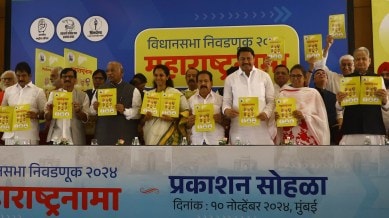Stay updated with the latest - Click here to follow us on Instagram
Health takes spotlight in political party manifestos in Maharashtra
Dr. Shukla emphasised the growing attention to equitable access to health services, particularly in rural areas.

Manifestos of political parties for the upcoming Maharashtra State Election show an increased focus on health marking a clear shift from past elections. To attract voters, parties are pledging health-focused initiatives, ranging from Universal Health Care and a mission to improve nutrition among tribal communities and providing free medication for lifestyle diseases and preventive healthcare programs for youth. While doctors applaud this shift in priorities, they urge the state to increase its health budget to ensure these promises are financially feasible and effectively implemented.
Dr. Abhay Shukla, national co-convenor of Jan Swasthya Abhiyan, a network of health professionals and NGOs, expressed optimism. “After 25 years in the health sector, this is the first time we’re seeing such a comprehensive commitment to key health issues. It’s a welcome change that points toward a more inclusive and equitable healthcare system.”
The Indian Express analysed the election manifestos and found that the ruling BJP’s manifesto outlines 14 health initiatives under the “Mission Swasth Maharashtra” program, aimed at strengthening the state’s public healthcare system. Among the proposals are increasing the number of medical professionals, opening PM Jan Aushadhi Kendras at primary health centres for affordable medicines, and expanding the Ayushman Bharat scheme to cover more hospitals.
The BJP also promises free health check-ups for lifestyle diseases such as hypertension and diabetes.
In addition to addressing lifestyle diseases, the BJP aims to combat sickle cell anaemia by establishing screening centres and research institutes. They also plan to boost blood supply services for thalassemia patients, introduce cancer screening at the taluka level, and deploy mobile medical units in remote tribal areas to ensure healthcare reaches the most underserved populations.
However, public health experts have raised concerns about some of the BJP’s promises, noting that several initiatives—such as free medical coverage up to Rs 5 lakh under Ayushman Bharat and Mahatma Phule Jan Arogya Yojana—have been previously announced but are now being reiterated ahead of the elections.
Meanwhile, the opposition Maharashtra Vikas Aghadi has proposed a “Right to Healthcare” policy for Maharashtra.
This policy would guarantee free access to quality healthcare services in both urban and rural areas and establish Universal Health Care across the state. It promises to equip sub-district hospitals, set up ‘mohalla clinics’, and establish 100-bed hospitals in every taluka. They also advocate for a gradual increase in the state’s health budget to 8% of the total state budget.
Additionally, the MVAs manifesto calls for filling vacant posts in the health department, regularising contract-based nurses, increasing honorariums for ASHAs, Anganwadi workers, and helpers, and expanding access to free essential medicines. The party also pledges to launch campaigns to combat anaemia and sickle cell anaemia and establish a “Patient Rights Charter” to address grievances and establish toll-free helplines.
Dr. Shukla emphasised the growing attention to equitable access to health services, particularly in rural areas.
“For the first time, we’re seeing a focus on preventative care and ensuring equitable access to health services, particularly in rural areas,” he said. “The adoption of the Right to Healthcare policy will not only improve service quality but will ensure that people from all walks of life can access free, quality healthcare, both in government and private hospitals.”
The Indian Medical Association (IMA) has also welcomed the political focus on health. Dr. Santosh Kadam, newly elected president of IMA Maharashtra, believes this renewed attention is a direct response to the gaps exposed by the COVID-19 pandemic.
“It is good to focus on health issues but whoever comes to the power, needs to increase the budget which still hovers around 4 percent—it needs to be increased to at least 8 percent to provide the facilities to the voters,” said Dr Kadam. “The government should increase the payment under AB-PMJAY to private hospitals, as the current reimbursement is too low, discouraging them from treating patients under the scheme,” he added.